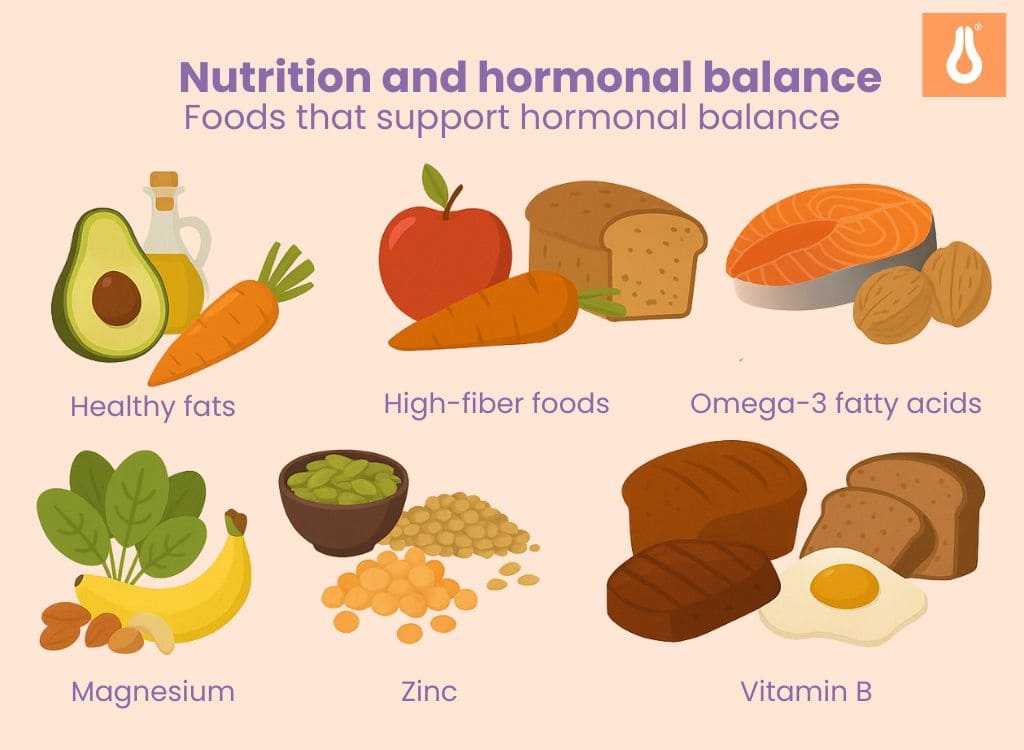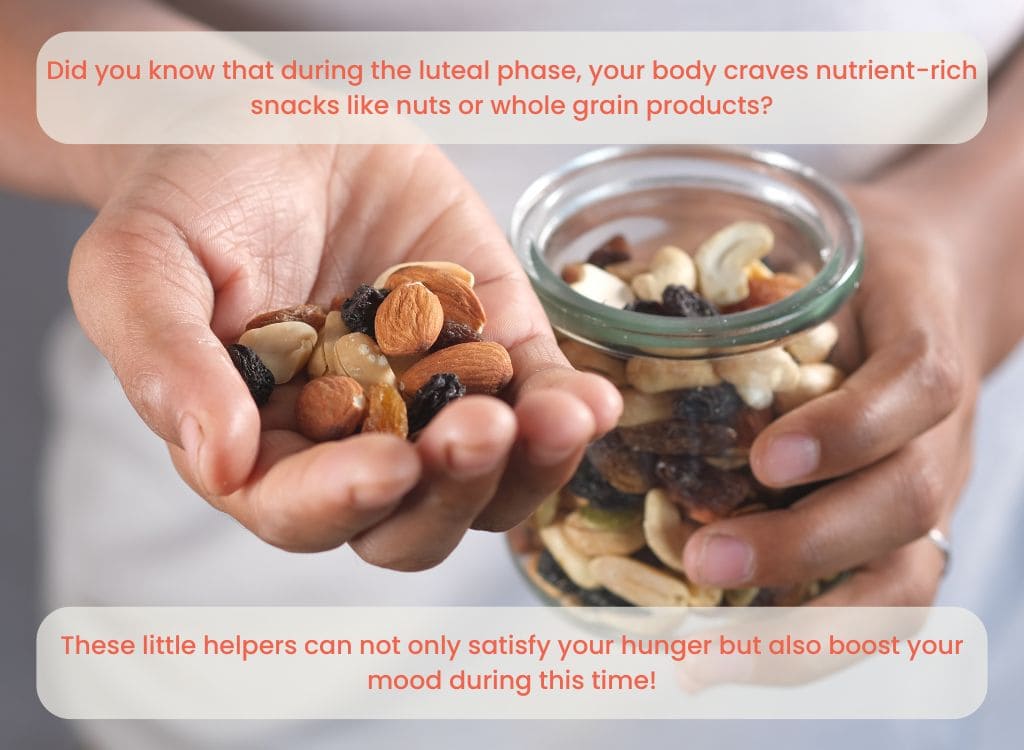
Menstrual cup: answers to the most frequently asked questions
4 de May de 2025
Menstrual Disc: What Is It and How Does It Work?
26 de May de 2025
Inhaltsverzeichnis
- Introduction to hormonal health and your cycle
- Nutrition and hormonal balance
- Sugar and processed foods: a stress factor for your hormonal balance
- Summary: how to support your hormonal balance with the right nutrition
- Foods and their effects on your cycle
- Practical tips for everyday life
- Nutrition during the different phases of your cycle
- Your diet as the key to hormonal balance
- FAQ: The 5 most important questions about hormonal health & nutrition
Have you ever wondered how much your diet affects your hormonal health and menstrual cycle? In fact, what you eat can have a direct impact on your cycle and hormonal balance. A well-balanced diet with the right nutrients can help reduce hormonal fluctuations and make your cycle more regular.
In this article, we’ll show you how intentional dietary choices can positively influence your hormones and support your cycle.
Introduction to hormonal health and your cycle
Hormonal health plays a central role in the menstrual cycle and influences how the body responds to its different phases. Hormones like estrogen, progesterone, and testosterone are responsible for regulating the cycle and preparing the body for each stage. These hormones are not only vital for reproduction, but also for many other physical processes – including mood, energy levels, and even skin health.
- Estrogen: Often called the “female” hormone, estrogen rises during the follicular phase. It helps mature the eggs and prepares the uterine lining for a potential pregnancy. Estrogen also has a noticeable effect on mood and skin.
- Progesterone: This hormone increases after ovulation and helps prepare the body for pregnancy. It stabilizes the cycle and has a calming effect on the body.
- Testosterone: Though known as a “male” hormone, testosterone also plays an important role in the female body. It supports libido and general well-being.
These hormones need to stay in balance to keep the menstrual cycle regular and the body functioning properly. An imbalance can lead to issues such as irregular periods, PMS, or even fertility problems.
Here’s a quick overview of how these key hormones function throughout the cycle:
Hormone | Function in the cycle | Cycle phase |
Estrogen | Promotes egg maturation and thickening of the uterine lining | Follicular phase, before ovulation |
Progesterone | Prepares the uterus for pregnancy, stabilizes the cycle | After ovulation, luteal phase |
Testosterone | Supports libido and overall well-being | Year-round, peaks during ovulation |
Maintaining the right hormonal balance is essential for a healthy cycle and overall hormonal wellness. In the next section, we’ll explore how your diet can help support this balance.
Nutrition and hormonal balance
Nutrition plays a key role in maintaining healthy hormonal balance. With the right food choices, you can support your hormone levels, stabilize your menstrual cycle, and improve your overall health. But which foods are especially important for regulating your hormones?
Foods that support hormonal balance
- Healthy fats: Fats are essential for hormone production. Healthy fats such as avocados, olive oil, nuts, and seeds help maintain hormonal balance. They support the production of estrogen and progesterone and help reduce inflammation.
- Fiber-rich foods: Fiber aids digestion and helps eliminate excess hormones like estrogen from the body. Vegetables, fruits, legumes, and whole grains are rich in fiber and contribute to a healthy hormonal system.
- Whole grains: Whole grains like oats, quinoa, and brown rice provide complex carbohydrates that help keep blood sugar levels stable and provide long-lasting energy. This stabilizing effect benefits hormonal balance.
- Omega-3 fatty acids: These essential fats, found in fatty fish (like salmon and mackerel), chia seeds, and walnuts, have anti-inflammatory properties and support the production of hormones like progesterone. Omega-3s are also crucial for general well-being.
Micronutrients that support your hormones
- Magnesium: Magnesium plays a vital role in hormone regulation, especially in managing menstruation and stress. It helps lower cortisol levels and reduces PMS symptoms. You'll find it in leafy greens, nuts, seeds, and bananas.
- Zinc: Zinc supports immune function and hormone production. It is particularly important for producing estrogen and progesterone. Pumpkin seeds, lentils, chickpeas, and oats are great sources of zinc.
- B vitamins: B vitamins like B6 and B12 are key to regulating hormones and managing stress. They’re found in whole grains, meat, eggs, and leafy greens and also help boost serotonin production, which supports emotional well-being.
Sugar and processed foods: a stress factor for your hormonal balance
Too much sugar and highly processed foods can throw your hormones out of balance, leading to inflammation and even insulin resistance. A high sugar intake can spike insulin levels, which in turn can disrupt hormonal balance by increasing androgen levels (male hormones). This can result in issues such as acne and irregular cycles.
To support hormonal health, it’s best to avoid excess sugar and ultra-processed foods like sweets, sodas, and fast food. These not only destabilize blood sugar but also promote inflammation. Instead, choose natural sources of sweetness, such as fruit or honey.
Summary: how to support your hormonal balance with the right nutrition
Food | Benefit for hormonal balance |
Healthy fats (e.g. avocados, olive oil) | Support the production of estrogen and progesterone |
Fiber-rich foods (e.g. vegetables, whole grains) | Help eliminate excess estrogen and stabilize blood sugar levels |
Omega-3 fatty acids (e.g. salmon, walnuts) | Reduce inflammation and support progesterone production |
Magnesium (e.g. leafy greens, nuts) | Lowers cortisol and eases PMS symptoms |
Zinc (e.g. pumpkin seeds, lentils) | Supports the production of hormones like estrogen and progesterone |
B vitamins (e.g. whole grains, meat) | Promote serotonin production and help stabilize hormonal balance |
Be sure to nourish your body with nutrient-rich foods and avoid excessive sugar and highly processed products. This will help you strengthen your hormonal balance and positively influence each phase of your cycle.

Foods and their effects on your cycle
Your diet has a direct impact on your hormonal balance and can positively influence your menstrual cycle. Certain foods support the production of estrogen and progesterone, help stabilize the cycle, and may even ease symptoms like PMS.
Foods that support estrogen and progesterone production
- Flaxseeds: These tiny seeds are rich in phytoestrogens, which can support estrogen levels in the body. They help stabilize hormonal balance and may regulate your cycle.
- Broccoli: Broccoli contains indole-3-carbinol, which supports the detoxification of excess estrogen and helps restore hormonal balance.
- Avocados: Loaded with healthy fats, avocados support progesterone production and enhance the absorption of fat-soluble vitamins that are key for hormonal health.
- Nuts: Walnuts and almonds are excellent sources of healthy fats that support hormone production. They also contain zinc, an important mineral for hormone regulation.
Superfoods for stable hormonal health
- Chia seeds: Rich in omega-3 fatty acids and fiber, chia seeds help stabilize blood sugar levels and lower inflammation in the body—both of which benefit hormonal balance.
- Spirulina: This nutrient-dense algae powder is packed with vitamins, minerals, and antioxidants. It promotes a healthy immune system and supports progesterone production.
How a balanced diet can relieve PMS and irregular cycles
A balanced diet not only helps regulate your cycle, but can also ease premenstrual syndrome (PMS) symptoms. Excess sugar and processed foods can disrupt hormonal balance and worsen PMS. In contrast, fiber-rich foods, healthy fats, and micronutrients like magnesium and zinc can help stabilize your mood and reduce physical discomfort.
By adjusting your diet and intentionally choosing foods that support hormonal health, you can positively influence your menstruation and your cycle as a whole.
Practical tips for everyday life
Eating the right foods can make a big difference in stabilizing your hormonal health and positively influencing your cycle. But how can you actually incorporate these tips into your daily routine? Here are some simple meal plans, snack ideas, and drinks that naturally support your hormones.
Simple meal plans and snacks that promote hormonal health
Breakfast:
- Oatmeal with chia seeds and nuts: Oats provide fiber to stabilize blood sugar. Combined with chia seeds (for omega-3s) and nuts (for healthy fats), this makes a balanced breakfast that supports hormone production.
- Avocado toast with an egg: Whole grain bread offers complex carbs, avocados provide healthy fats, and the egg gives you protein and vitamin D—all essential for hormonal balance.
Lunch:
- Quinoa bowl with broccoli, flaxseeds, and salmon: Quinoa is a protein-rich, gluten-free grain alternative. Combined with flaxseeds (to support estrogen), broccoli, and omega-3-rich salmon, this meal is excellent for hormonal health.
- Green salad with chicken, walnuts, and olive oil: Chicken delivers quality protein, walnuts supply healthy fats, and olive oil supports hormone production.
Snack ideas:
- Almonds or walnuts: A small handful of nuts is a quick snack that provides healthy fats and supports progesterone production.
- Veggie sticks with hummus: A great fiber- and fat-rich snack for in between meals.
Recommended drinks and their benefits for hormonal balance
Teas:
- Peppermint tea: This calming tea may help balance hormones by lowering insulin levels. It can also ease PMS symptoms and reduce bloating.
- Ginger tea: Known for its anti-inflammatory properties, ginger can relieve menstrual cramps, boost circulation, and positively impact your cycle.
- Rooibos tea: Rich in antioxidants, rooibos strengthens the immune system and has a calming effect. It helps reduce stress and promotes hormone balance.
Smoothies:
- Green smoothie with spinach, avocado, and flaxseeds: Spinach is an excellent magnesium source to stabilize mood. Avocados add healthy fats, and flaxseeds support estrogen levels.
- Berry smoothie with chia seeds and almond milk: Berries are rich in antioxidants that support hormone function. Chia seeds provide omega-3s to help stabilize the cycle.
Your everyday life, your choice
It doesn’t have to be difficult to adjust your diet in a way that supports your hormonal balance. Small but effective changes in your daily meals and drinks can have a lasting positive impact on your cycle. By incorporating the right foods into your routine, you’re helping your body stay balanced – in a simple and delicious way!

Nutrition during the different phases of your cycle
Nutrition doesn’t just play a general role in your hormonal health—it can also be used in a targeted way to support you during each phase of your menstrual cycle. Every phase comes with its own hormonal changes, and specific foods can help your body adapt and thrive.
- Menstrual phase (Days 1–5): During this phase, the body sheds the uterine lining, which can lead to fatigue and lower energy levels. Iron-rich foods like leafy greens, lentils, and red meat help replenish iron stores. Anti-inflammatory foods such as ginger and turmeric can help relieve cramps and support the body’s healing process.
- Follicular phase (Days 1–13): As estrogen levels begin to rise, your body needs energy and blood sugar stability. Whole grains, healthy fats, and omega-3 fatty acids from sources like salmon and chia seeds support estrogen production and help you feel energized during the early days of the cycle.
- Ovulation phase (Days 14–16): Testosterone peaks around ovulation, often making you feel more energized and confident. A diet rich in protein combined with healthy fats—such as avocados and nuts—can help sustain that energy boost and support your overall well-being during this high-vitality phase.
- Luteal phase (Days 15–28): After ovulation, progesterone dominates, and PMS symptoms like mood swings and cravings are more likely. This is the time to focus on fiber-rich foods, magnesium-rich options like leafy greens and bananas, and zinc-rich foods such as pumpkin seeds. These nutrients help stabilize mood and soothe the body.
By consciously aligning your diet with the different phases of your cycle, you can naturally support your hormonal balance and feel your best throughout the month.
Your diet as the key to hormonal balance
Now that you know how to adapt your diet to the different phases of your cycle, you have the chance to support your hormonal health in a lasting and natural way. With the right food choices, you can boost your energy, ease PMS, and bring more stability to your cycle overall.
If you want to learn more about how to support your cycle effectively, take a look around our PapayaCup Blog – you’ll find plenty of helpful tips and exciting articles on menstruation, hormonal health, and sustainable period products. Curious about how to manage stress throughout your cycle? Or maybe you're wondering how to use your menstrual cup correctly and make it part of your daily routine? Our site is full of advice and practical insights to help you support your health naturally.
Discover the PapayaCup Shop and find the menstrual cup that fits your body and needs perfectly. Our practical size guides and expert tips will help you make the right choice. And if you have any questions, don’t hesitate to reach out – we’re always here for you!
Start today with healthier eating habits and a more balanced cycle – with PapayaCup!
FAQ: The 5 most important questions about hormonal health & nutrition
Foods rich in healthy fats (avocado, nuts, olive oil), omega-3 fatty acids (salmon, chia seeds), magnesium (leafy greens, bananas), and fiber (vegetables, whole grains) are proven to support hormonal balance. They help regulate estrogen and progesterone levels and stabilize blood sugar.
You can read more in our article “Comfort Food: 7 Foods That Boost Your Mood” on PapayaCup.com.
Yes. A balanced diet can reduce cycle irregularities, ease PMS, increase energy, and support overall hormonal balance. Key nutrients include omega-3s, magnesium, B vitamins, and fiber-rich foods. Excess sugar consumption, on the other hand, can destabilize the cycle.
Magnesium-rich foods such as spinach, nuts, and bananas, along with omega-3 fatty acids and complex carbohydrates, have been shown to support PMS relief. They calm the nervous system, reduce inflammation, and promote hormonal balance.
You can find a deeper explanation in our blog article “Understanding and Relieving Period Pain”.
Sugar and highly processed foods cause your insulin levels to spike, promote inflammation, and can lead to hormonal imbalances – such as stronger PMS, fatigue, acne, or irregular cycles. Reduce sweets, sodas, and packaged snacks, and opt for natural sources of sweetness like fruit or honey.
You can support your cycle by adjusting your nutrition to each phase:
- Menstrual phase: iron-rich foods and warming meals
- Follicular phase: whole grains and healthy fats for energy
- Ovulation: protein and micronutrients
- Luteal phase: magnesium, zinc, and calming foods
A detailed explanation can be found in the article “Cycle Phases & Stress Management – How to Stay Calm” on PapayaCup.com.



